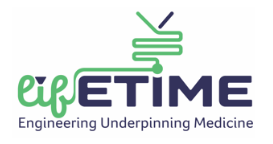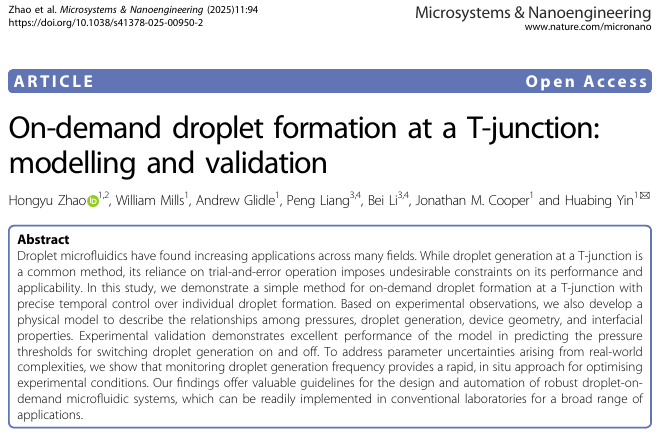Academia–Industry Collaboration Drives Innovation in Singel-Cell Microfluidic Technology
Deep Collaboration between Hooke Instruments and the University of Glasgow
Background of the Collaboration
The University of Glasgow is one of the world’s leading universities, and its James Watt School of Engineering is renowned for its strong research foundation in microfluidics and single-cell analysis. We are honored to collaborate closely with Professor Huabing Yin and her team at the University of Glasgow to advance research in single-cell sorting and analysis.
Professor Huabing Yin is a Professor of Biomedical Engineering at the University of Glasgow and an internationally recognized expert in single-cell technology, microfluidics, and Raman Activated cell sorting. Her research focuses on developing advanced tools and methodologies to study microscopic phenomena in life and environmental sciences.
As an industrial partner of the EPSRC LifETIME Centre for Doctoral Training (CDT) , Hooke Instruments collaborates with Professor Yin to jointly train young scientists, including Ph.D. student William Mills. This deeply integrated model of collaboration injects industrial perspective into frontier scientific exploration while nurturing top-tier talent for future innovation.
“The LifETIME CDT is jointly established by the University of Glasgow, the University of Birmingham, Aston University, and Science Foundation Ireland’s CÚRAM Centre. It aims to cultivate innovative leaders in the fields of non-animal technologies and regenerative medicine.”
Collaborative Achievements
Through the joint efforts of both teams, this collaboration has already produced remarkable results. The research groups have jointly published an important study in Microsystems & Nanoengineering (Nature Portfolio), introducing a new method for on-demand droplet formation at a T-junction. This work represents a significant innovation in the fundamental principles of microfluidic control, enabling more precise and reliable operation in high-throughput biological applications. The study provides valuable design and modeling guidance for droplet-on-demand systems, with potential to accelerate developments in cell encapsulation and single-cell sorting.
Source:doi.org/10.1038/s41378-025-00950-2
Leveraging Hooke’s extensive experience in single-cell sorting and analysis, academic exchanges with Professor Yin’s team—focused on precise droplet formation and gentle cell handling—have provided fresh inspiration for Hooke’s continued technological evolution. Such academia–industry dialogue strengthens Hooke’s mission to deliver reliable, high-performance tools that empower life science research worldwide.
Looking Ahead
At Hooke Instruments Ltd., innovation has always been the driving force behind our growth. We are dedicated to combining cutting-edge scientific knowledge with precision industrial capabilities to deliver professional, efficient, and advanced instruments and solutions for the life sciences.
To achieve this, we continue to build a global network for academia–industry collaboration, forming deep strategic partnerships with leading research institutions around the world.
The collaboration between Hooke Instruments and the University of Glasgow stands as a successful example of academia–industry synergy and co-innovation. Looking ahead, we aim to further strengthen our partnership with Professor Huabing Yin’s group, exploring the integration of microfluidics, artificial intelligence, and Raman spectroscopy to develop next-generation life science instruments and solutions, continuously creating value for researchers and industry partners worldwide.
Reference:
1. Hongyu Zhao, William Mills, Andrew Glidle, PengLiang, Bei Li, Jonathan M. Cooper, Huabing Yin. On-demand droplet formation at a T-junction: modelling and validation. Microsystems & Nanoengineering. 2025 11:94, doi.org/10.1038/s41378-025-00950-2
2. Wang Y, Xue Y, Hong X, Wang H, Zhou C, Wang W, Sheng J, Liang P, Li H, Xu Q, Wang Y, Liu K, Shang L, Peng H, Chen F, Zhang K, Yin H, Wang Y, Deng F, Feng S, Huang WE, Li B. Functionalized microwell laser sorting method for single-cell viable microbial detection. Sens Actuators B Chem. 2025 Volume 427, doi:10.1016/j.snb.2024.137202
3. Yanqing Song, Jianan Yin, Wei E. Huang, Bei Li, Huabing Yin. Emerging single-cell microfluidic technology for microbiology. TrAC Trends in Analytical Chemistry. 2024 Volumn 170. doi:10.1016/j.trac.2023.117444
4. Bo Liu, Kunxiang Liu, Nan Wang, Kaiwen Ta, Peng Liang, Huabing Yin, Bei Li, Laser tweezers Raman spectroscopy combined with deep learning to classify marinebacteria,Talanta, 2022 Volumn 244 ,doi:10.1016/j.talanta.2022.123383.







